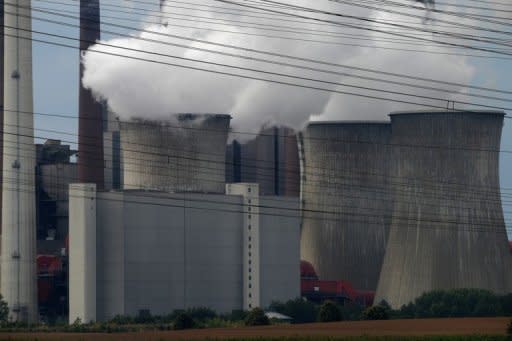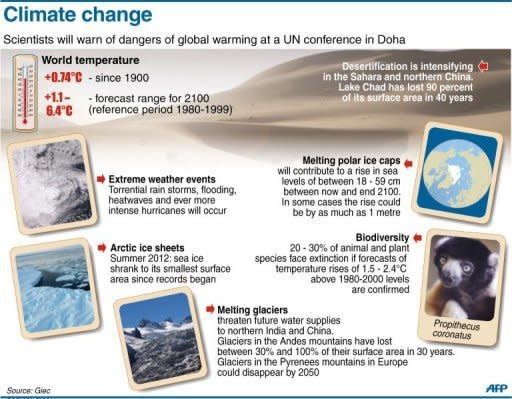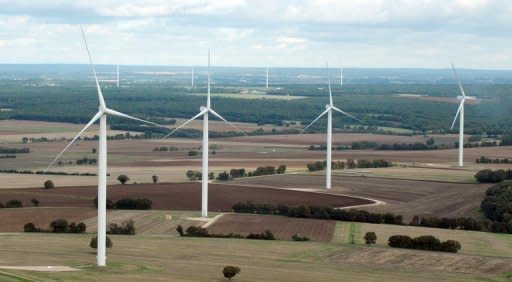Clock is ticking fast, UN climate talks told
Nearly 200 nations launched a fresh round of United Nations climate talks in Doha on Monday amid urgent appeals to scale up the fight against Earth-warming greenhouse gas emissions. "Time is running out," UN climate chief Christiana Figueres told a press conference. "The door is closing fast on us because the pace and the scale of action is simply not yet where it must be." The runup to the 12-day conference -- the annual climax to negotiations on climate change -- coincided with a welter of warnings that violent events like superstorm Sandy will become commonplace if mitigation efforts fail. Experts said pledges to mitigate greenhouse gas pledges are not enough to limit warming to the UN goal of two degrees Celsius (3.6 degrees Fahrenheit) above pre-industrial levels. This is the level at which scientists believe we may be spared the worst effects of climate change. "This is a historic conference of crucial importance," said Qatar's conference president, Abdullah al-Attiya. "We must work seriously in the next two weeks... be flexible and not dwell (on) marginal matters." Topping the talks under the UN's Framework Convention on Climate Change (UNFCCC) is the future of the Kyoto Protocol, the world's only binding pact for curbing carbon emissions. The protocol, whose first commitment period runs out on December 31, commits about 40 rich nations and the EU to an average five percent greenhouse gas reduction from 1990 levels. Critics say the accord is badly flawed as it does not include the United States and China, the world's biggest emitters, in the binding targets. Nations disagree on how long the next Kyoto commitment period should last and the scope of its carbon pledges. The EU, Australia and some small Kyoto parties, representing about 15 percent of total global emissions, have said they would take on commitments in a second period, but New Zealand, Canada, Japan and Russia will not. "In Doha, governments must agree to the continuation of the Kyoto Protocol and close the loopholes that could give countries a free pass to pollute for years," urged Greenpeace's Martin Kaiser. "At the end of a year that has seen the impacts of climate change devastate homes and families around the world, the need for action is obvious and urgent." Also crucial in Doha is for delegates to draft a work plan for arriving in the next 36 months at a global climate deal that must enter into force in 2020 and will apply to all countries. Negotiators, to be joined in the last four days by cabinet ministers from more than 100 nations, will be under pressure to raise pre-2020 emission reduction targets. The European Union was "ready" to raise its emission cut target from 20 to 30 percent by 2020, but only "if other developed economies will also" aim higher, the European Commission's chief climate negotiator Artur Runge-Metzger told reporters. But Jonathan Pershing of the United States said he did "not anticipate" his country shifting its own 2020 target of a 17-percent reduction from 2005 levels. Another focus of the talks: rich nations will be expected to come up with funding for the developing world's mitigation actions. According to Oxfam, "developing countries are heading towards a climate 'fiscal cliff' without any certainty about how they will be supported to adapt to climate change after 2012 draws to a close." For its part, a grouping of African countries, poor nations and small island states most at risk of climate change-induced sea level rise said failure in Doha would be "a setback from which we may never recover". Last week, the UN Environmental Programme (UNEP) said the world was heading for a 3-5 Celsius (5.4-9 Fahrenheit) rise this century barring urgent action. The World Bank said a planet that is 4 Celsius (7.2 Fahrenheit) warmer would see coastal areas inundated and small islands washed away, food production slashed, species eradicated, more frequent heat waves and high-intensity cyclones, and diseases spread to new areas. Exhaust rises from cooling towers at the Neurath lignit coal-fired power station in Grevenbroich, Germany. Nearly 200 nations launched a fresh round of United Nations climate talks in Doha faced with appeals for urgency in their efforts to reduce Earth-warming greenhouse gas emissions. Graphic showing the consequences of global warming in the next decades. Nearly 200 nations launched a fresh round of United Nations climate talks in Doha faced with appeals for urgency in their efforts to reduce Earth-warming greenhouse gas emissions. Wind turbines between Poitiers and Angouleme in France. Nearly 200 nations launched a fresh round of United Nations climate talks in Doha on Monday faced with appeals for urgency in their efforts to reduce Earth-warming greenhouse gas emissions. Damage created by superstorm Sandy in New Jersey in October. Nearly 200 nations launched a fresh round of United Nations climate talks in Doha on Monday faced with appeals for urgency in their efforts to reduce Earth-warming greenhouse gas emissions.

 Yahoo Finance
Yahoo Finance 



